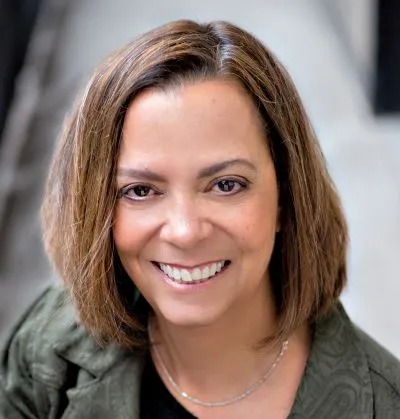Claire Hartfield, ’82: Context and Career Thrive at the Intersection of Education and Law

A Few Red Drops, the 2018 book by Claire Hartfield, ’82, is a sweeping and detailed recounting of the weeklong race riots that shook Chicago in 1919 and the political, social, and economic events that led up to them and followed from them. It has won broad recognition, including the 2019 Coretta Scott King Book Award.
A Few Red Drops is aimed at young adults, and Hartfield said the inspiration to write it came to her during the 2014 events in Ferguson, Missouri, when Michael Brown was killed by a police officer. “I’ve been working in the education field in one way or another for more than 30 years now, and I have seen that while young people are very aware of what is going on in society, they view it through a narrow lens of their own experiences,” she said. “I wanted to try to add some historical context that might broaden their perspectives.”
Her interest in educational issues began early in her life, and when she was a senior at Yale she wrote a lengthy study of equality focused on three Supreme Court decisions: Plessy v. Ferguson, Brown v. Board of Education, and Regents of the University of California v. Bakke. Law school was a logical next step, and Chicago was where she wanted to be, in part because she had grown up in Hyde Park. “I knew that the UChicago Law faculty was brilliant, and the professors actually surpassed my expectations,” she said. “I also had some great clinical experiences, and I have found that the law and economics focus, which I hadn’t expected to be very applicable to my interests, has been really beneficial for how I think about things.”
A few years after graduation, her work at a law firm got her involved with the oversight of school desegregation plans in Chicago and Rockford. She took on part-time status at that firm when her first child was born and continued that until the birth of her third child, when she stopped working entirely for the five years until her daughter started school. “I could have continued on a part-time basis, but I wanted to be 100 percent present for those years with my daughter and my other growing children,” she said.
Deciding that for her next step she wanted to have a hands-on relationship with an education provider, she joined the newly formed Alain Locke Charter School in Chicago, guiding the process of setting in place its governance and compliance structures. She remained with the school in a variety of capacities as it achieved striking success, including being ranked first in Illinois in academic proficiency at serving predominantly low-income African-American students from kindergarten through eighth grade. She was one of the founders of Accelerate Institute, which helps principals and other school administrators develop leadership and change management skills.
She said that as she travels around the United States discussing her book with students and other groups, she is struck by many connections between the past and the present: “My grandmother lived through the 1919 riot and told me her stories from that experience and now here I am telling others about it, and many of the forces that created the riots are still operating in our country today. But I know from watching my own children, who are now young women, that there is talent and passion in the next generation for creating a better future.”
She observed that she was particularly affected by an encounter with a young student who considered the action that directly incited the riots—the death of a black teenager from a rock thrown by a white man as the teenager was peacefully drifting near a raft in Lake Michigan with his friends—and then said, “That boy could have been me.” The student’s comment, she said, “collapsed events of a hundred years ago right into the present. That understanding is at the heart of why I wrote A Few Red Drops.”


